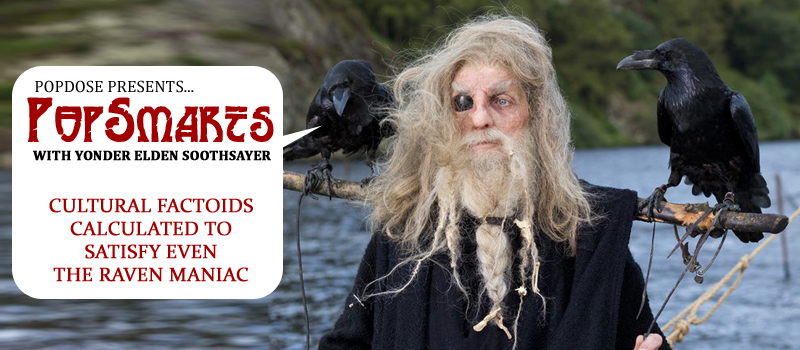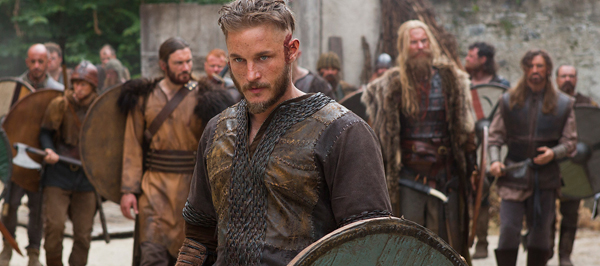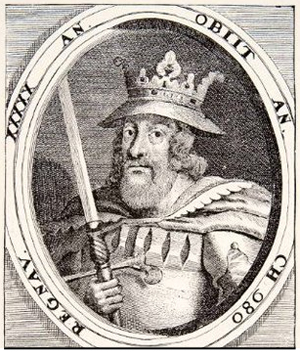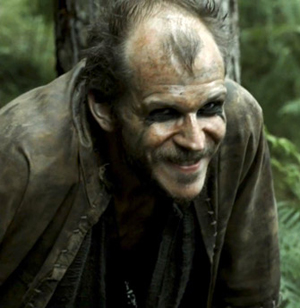
The second season of Vikings, last year’s basic-cable breakout hit, is coming into its homestretch, and the intrigues are piling up. Handsomely shot on locations in Ireland and Canada, and boasting magnetic lead performances, Vikings tells the story of Ragnar Lothbrok, a semi-legendary Danish chieftain and raider who plundered his way up and down the English coastline in the dawn years of the 9th Century.
Vikings is the first scripted drama created for History — formerly known as the History Channel, but rebranded, like so many cable networks, to blur the distinction between the thing being disseminated and the vehicle for its distribution — but its historical provenance is doubtful, at best. That’s because the historical record is itself exceedingly thin.

Although the Vikings had a written language, rendered in runes, it was reserved only for ceremonial inscriptions. The Norsemen relied on oral transmission, and there was a lively tradition of bardic poetry and song. It wasn’t until the simultaneous introductions of Christianity and the Latin alphabet in the 12th Century that the Vikings thought to write down their stories and songs.
As a result, everything we know about Viking culture from before approximately 1250 A.D. we have learned from accounts written by others — namely, the people whose lands they raided. There’s an obvious problem of bias in these accounts. And the accounts of the Norsemen themselves — including the half-dozen or so works that mention Ragnar Lothbrok, such as the Ragnarsdrápa, the Krákumál, and the Latin Gesta Danorum of Saxo Grammaticus (not to be confused with ”Sex-O Grammaticus,” which was your Old Professor’s screen name on a long-gone message board for lonely academics) — were all written a good three or four hundred years after the events they describe.
Anyone who suffered through Homer’s Iliad in high school will remember how that works. History becomes a game of Chinese Whispers. Repetition introduces embellishments; separate characters become conflated; chronologies get muddled. Real-world events drift quickly into the realms of the unreliable.
The transformation of historical fact into legend begins with the loss of context. We have a name, or a fact — but we’re only getting the punchline; we’re not getting the whole joke. The meaning is lost, and our active imaginations scramble to provide one.
To pull an example from the same milieu as Vikings; Harald Bluetooth was king of Denmark and Norway in the late 10th Century, credited with introducing Christianity to the Danes. We know his sobriquet, ”Bluetooth” — but we don’t know its origin. It’s probable that he was so called for the ghastly state of his gnashers. But we don’t know for sure, because nobody bothered to write the reason down. Maybe that sort of personal tidbit simply wasn’t considered important enough to commit to writing; or maybe (and this strikes me as probable) the nickname’s origin was simply common knowledge in Harald’s day, and nobody thought they would ever need to write it down.
 In the absence of hard evidence, all sorts of alternate theories have been proposed, stitching together the disparate bits and bobs that we do know. We know, in a possibly-unrelated historical factoid, that Harald was considered an eloquent speaker; and so we speculate that perhaps ”blue tooth” was an idiom of his day, analogous to our ”silver tongue.” (This, presumably, was the interpretation that Jim Kardach was going for when he proposed the name for the wireless communication standard his team was developing.) We know, too, that blue-dyed fabric was very expensive in Harald’s time; and we wonder if perhaps the king’s wardrobe was so lavish that you might joke that even his teeth were blue.
In the absence of hard evidence, all sorts of alternate theories have been proposed, stitching together the disparate bits and bobs that we do know. We know, in a possibly-unrelated historical factoid, that Harald was considered an eloquent speaker; and so we speculate that perhaps ”blue tooth” was an idiom of his day, analogous to our ”silver tongue.” (This, presumably, was the interpretation that Jim Kardach was going for when he proposed the name for the wireless communication standard his team was developing.) We know, too, that blue-dyed fabric was very expensive in Harald’s time; and we wonder if perhaps the king’s wardrobe was so lavish that you might joke that even his teeth were blue.
And it short order we’ve gone from a failure to understand a single name to a willful misunderstanding of an entire culture; from a gap in the historical record to a pantload of unwarranted conjecture. In insidious fashion, the little things we don’t know can distort our interpretations even of what we do know.
(This kind of thing still happens, of course. Nearly every article ever written about the Replacements refers to them at one point or another as ”the mats,” but only a tiny fraction of those articles ever say why. Now imagine that 85% of everything currently in print were to disappear overnight, and the historians of 400 years from now had to reconstruct today’s world from the 15% that remained.)
King Harald was born a century after the events of Vikings, but his story gives us a window into the difficulties of constructing from the source material of the sagas a narrative satisfying to modern sensibilities. Tags like ”Bluetooth” were important in a culture that lacked any standardized system of patrilineal surnames; they helped to tell the players apart, and — in their proper context, known to listeners at the time but now largely lost to us —provided a little bit of backstory. Ragnar Lothbrok is cut from the same cloth. His byname, from the Old Norse LoÁ°brÁ³k, means ”hairy trousers”; the reasoning is obscure, but it remains tempting (if unprofitable) to connect Ragnar’s itchy britches with the platoon of sons he is reputed to have sired with at least three recorded wives.
The sagas tell us that the sons all grew to be great warriors, as well, each with a more-or-less baffling nickname of his own. The eldest, BjÁ¶rn Ironside, is straightforward enough; but he was accompanied by head-scratchers like Sigurd Snake-in-the-Eye (seen in Vikings as an infant with a curiously-malformed pupil) and Ivar the Boneless, which has been taken to indicate everything from extraordinary agility to a case of spina bifida. (The most recent episode at the time of this writing — as yet unseen by your Old Professor — is entitled ”Boneless,” so perhaps an explanation is forthcoming.)
The scantiness of the historical record may be frustrating for scholars, but it’s a gift to the showrunners, leaving them at liberty to imagine great swathes of the story — and to leave other aspects unimagined. Vikings cannily turns the lack of historical certainty into an essential part of its worldview. Its characters move in a world without a written record; and without the guidance of the past, anything seems possible.
As the series opens, Ragnar’s people initially lack a reliable means of navigation across the open ocean; their world is limited to the fjords and rivers of the Scandinavian peninsula. England, their neighbor to the west, is terra incognita, and Christianity only a rumor. As viewers, we are privy to things the characters do not know — but we are eager for them to find out. We impute our viewpoint to Ragnar Lothbrok, because he, of all the characters, seems to have at least some inkling that he is part of a larger world, some grand design.
Ragnar is a visionary. He proposes grand and daring schemes, gambles big and wins. He is constantly contrasted with men of lesser imagination, like Season 1 heavy Jarl Haraldson (played by Gabriel Byrne) or the crass, provincial King Horik (Donal Logue). Ragnar seems, by comparison, a very modern figure, a stranger in his own era. Much of that is down to Travis Fimmel’s performance; he imbues Ragnar with a cold, wary intelligence, so that even as he drives events, he often seems like a bemused observer — an alien, or a time-traveler flown in from some unknowable future, taking everything in with his spooky pale timber-wolf eyes.
England, in turn, has slipped into its own Dark Ages. The Roman occupation of Britain has faded from memory. A few educated men move to preserve the ancient knowledge — among them the oily King Ecbert of Wessex (Linus Roache), whose castle is built upon Roman ruins, and who luxuriates in the great heated bath tucked away beneath his throne room — but among the common people, the roads and walls and statuary that remain, crafts far beyond the skill of any English mason or artisan, are assumed to be the remnants of a race of giants, and regarded with a semi-religious awe.
There’s a delicate dance around those religious elements. Vikings is not interested in tearing down the old legends — at least it’s not a straight-up deconstruction in the mode of Mary Renault’s The King Must Die, which set out very deliberately to explain the myth of Theseus and the Minotaur in wholly rationalist terms. There’s nothing definitively supernatural going on in Vikings, no dragons or miracles or visitations from Thor. There are some ambiguously-phrased prophecies, and a handful of visionary experiences that may be hallucinations brought on by psilocybin mushrooms or PTSD — but then again, they may not be. So far, it remains the show’s strategy to allow for all manner of possibilities. The existence or non-existence of magic, prophecy, or the gods — these questions are secondary to the real concern of Vikings, which is human ambition. And so it leaves its options open.
Some commentators — among them, our learnÁ©d friend Dennis Perkins, writing for The AV Club — have been critical of this tactic, seeing the show’s refusal to come down on one side or the other as a failing. But your Old Professor must here disagree. Vikings has no pretensions of being an objective anthropological study. It is a historical drama, and as such it tries to play fair with the worldview of its characters. Its narrative assumptions are their assumptions. The show is ambivalent about the existence of the supernatural because these people — in this time, in this place, in this culture — are by and large ambivalent.
The pagan characters are mostly pragmatic in their piety. They pray only when they need something. (Ragnar’s first-season dialogues with the erstwhile monk Athelstan about the latter’s Christian practice were dryly comic, with Ragnar interrogating this strange doctrine of mercy and sacrifice, trying to puzzle out what might be in it for him.) No one’s giving praise for its own sake. They sacrifice to ensure good harvests or victory in battle. They visit soothsayers when they want to cheat fate.
 But for the Viking rank and file, the old myths command little reverence. They feel — as would most of us — that there’s something squirrely about someone who ascribes everything to supernatural agencies. Vikings finds both humor and lurking unease in this territory. When Ragnar’s second wife, the self-styled ”princess” Aslaug, proclaims that she is descended from the legendary hero Siegfried and the demigoddess Brunnhilde, nobody snickers outright — but bystanders exchange disbelieving glances and rolled eyes. The innovative boat-builder Floki is forever banging on about the will of the gods and his hatred of Christianity — but Vikings never lets us doubt that Floki is cuckoo for fuckin’ Cocoa Puffs.
But for the Viking rank and file, the old myths command little reverence. They feel — as would most of us — that there’s something squirrely about someone who ascribes everything to supernatural agencies. Vikings finds both humor and lurking unease in this territory. When Ragnar’s second wife, the self-styled ”princess” Aslaug, proclaims that she is descended from the legendary hero Siegfried and the demigoddess Brunnhilde, nobody snickers outright — but bystanders exchange disbelieving glances and rolled eyes. The innovative boat-builder Floki is forever banging on about the will of the gods and his hatred of Christianity — but Vikings never lets us doubt that Floki is cuckoo for fuckin’ Cocoa Puffs.
If anything, Vikings presents a fair and truthful picture of religious faith and its place in society — even our own. For most of us in the here-and-now, piety is usually tinted with skepticism, and vice versa; agnostics hedge their bets, and even those predisposed to the idea of divine intervention will generally recognize dumb luck for what it is. When we witness an uncanny coincidence or an unexpected recovery, we may pay lip service to ”miracles” or ”the hand of God,” and we’re not lying, exactly — but we are (most of us) down for a rational explanation, even if we don’t know what it is. Like they used to say on The X-Files, we want to believe. We would be delighted to find incontrovertible evidence, say, of the existence of angels — and it would surprise the hell out of us should such evidence be forthcoming.
Faith is complicated. There is no reason to think that it was any less so for even our distant ancestors. Pretending otherwise, for the sake of streamlined storytelling, is a cheat.





Comments